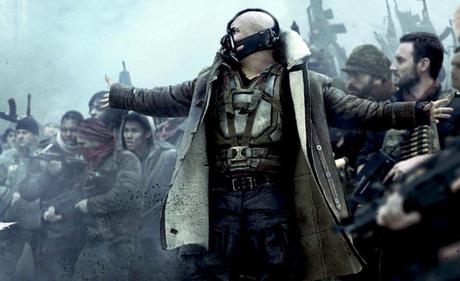Contributor: Andy Spencer
Written by Christopher Nolan and Jonathan Nolan
Directed by Christopher Nolan
“The Dark Knight” was the perfect superhero movie. I have seen pretenders to the throne come and go. “Watchmen” tried, but got lost in its unoriginality. “Chronicle” couldn’t match the scale, and “The Avengers” wasn’t nearly mature enough. “The Dark Knight” Rises does not usurp its predecessor. How could it? With Heath Ledger’s Oscar-winning performance, impossible moral conundrums, brilliant screenplay, and crime epic sensibilities, it simply cannot be topped in the foreseeable future. What “Rises” does accomplish, however, is just as impressive: it is a worthy successor. Expectations were higher than Everest for Christopher Nolan’s final depiction of The Caped Crusader. And they have been met.

“The Dark Knight” began with gunshots, which never ceased until the final frame. It was an expertly paced thrill ride. This is the main, and possibly only, weakness of “Rises”; it saves most of its action mojo for the final hour. While there are some truly adrenaline-pumping scenes early on, the beginning is mostly spent on remarkably involving, intercharacter drama. Quite a bit of it involves two of the new characters. Miranda Tate (Marion Cotillard), an integral member of Wayne Enterprises, is practically forced onto Wayne by Alfred and Fox. She holds his company (and Wayne himself) together when it is a hair’s breadth away from bankruptcy.
Meanwhile, Catwoman (Anne Hathaway, whose sexiness in this film cannot be overstated) juggles a few difficult tasks herself. She acts as Batman’s love interest and part time nemesis, and steals trinkets (including Wayne’s mother’s necklace) to make her living. She also represents the 99 percent, fitting into the economic statements presented a bit heavy-handedly in the film. While not handled as deftly as it could have been, it works in terms of the story Nolan and co. are trying to tell, and is sufficiently close to home to infuse a disturbing undercurrent into the proceedings.
Bruce Wayne has exiled himself from Gotham, to protect the lie that hold the city together. It is truly sad to see what has become of him in the eight years between the last film and now. It makes you worry for him. And said worry is well founded. This is not a happy film, despite what the title might imply. Many people die, some of them key figures in the story. Old friendships are tested, and a few shattered. Hope is lost and found. And Batman’s spine is snapped by Bane (Tom Hardy), a villain whose brute strength is matched only by his utter relentlessness.
While of course no match for Heath Ledger’s Joker, Hardy does a good (and decipherable) job of portraying his character. Bane has no moral dilemmas in store for Batman. His only goal is to torture the Dark Knight by razing Gotham to the ground. This he does in many a memorable scene, the best of which involves a football stadium and several tons of explosive. Further discussion of the story will venture into spoiler territory, but suffice it to say that there are plenty of callbacks to prior films that tie the narrative up quite nicely.
The technical quality of the production is superb. Nolan’s love of practical effects, rather than CGI, is well known, and there are countless instances where CGI could have been employed without much consequence. However, the use of real objects and people brings a visceral physicality to the film that cannot be denied. In IMAX, a large-scale showdown between police, prison escapees, Bane, and Batman makes for something truly unforgettable. As the city is gradually reduced to anarchy, the palpably desperate tone never falters, and is sustained by the knowledge that, for good or ill, this is the end. And what an end.
“The Dark Knight Rises” somehow feels unlike either of its predecessors. The sheer scale of the action scenes and pure seriousness of the drama ensure that it feels unique. And while the perfection of “The Dark Knight” may never be matched, “Rises” succeeds enough on its own terms to stand proudly alongside its older brother. There are no over-the-top truck flips here, no maniacal clown threatening to expose Batman’s true identity. This film is Christopher Nolan’s answer to the question he asked seven years ago in “Batman Begins”, and I now pose to you: Why do we fall?
Score: 10/10

